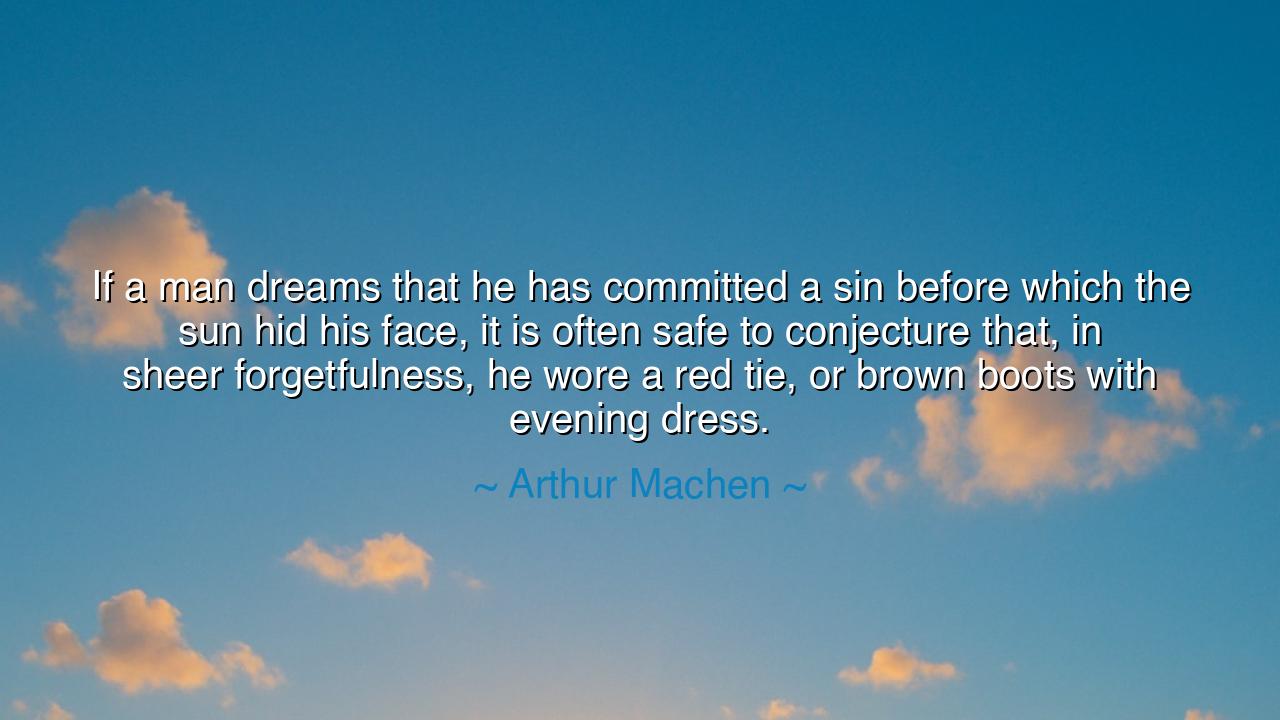
If a man dreams that he has committed a sin before which the sun
If a man dreams that he has committed a sin before which the sun hid his face, it is often safe to conjecture that, in sheer forgetfulness, he wore a red tie, or brown boots with evening dress.






When Arthur Machen, the mystic of the unseen, wrote, “If a man dreams that he has committed a sin before which the sun hid his face, it is often safe to conjecture that, in sheer forgetfulness, he wore a red tie, or brown boots with evening dress,” he was not speaking merely of fashion or folly. Beneath his quiet humor lies a deep reflection on the strange disproportion between guilt and innocence, between what man feels and what he has actually done. Machen, who lived in an age trembling between faith and skepticism, sought to uncover the mysterious tension between the spiritual and the trivial, the sacred and the absurd. His words, though veiled in wit, reveal the hidden chambers of the modern soul—how it punishes itself for trifles while forgetting the great and terrible sins that truly matter.
In the dream Machen describes, the man imagines he has committed an unspeakable transgression, so vast that even the sun turns its face away. And yet, upon waking, there is no crime, no blood, no betrayal—only the foolishness of a red tie or the indecency of brown boots at a formal supper. What is Machen saying? He reminds us that the human conscience, divorced from its spiritual anchor, often distorts the measure of sin and shame. We tremble before the judgment of society, while ignoring the quiet judgment of the soul. We mistake error in etiquette for moral evil, and forget that true wickedness lies not in breaking custom, but in betraying truth, compassion, and integrity.
Machen lived in Victorian and Edwardian England, an age obsessed with appearance and propriety. The world he inhabited placed greater weight on the correctness of one’s tie than on the condition of one’s heart. To wear brown boots with evening dress was not merely unfashionable—it was improper, a breach of the unspoken law of refinement. Yet this outward refinement often masked spiritual emptiness. Thus, Machen’s irony cuts deep: a man who has done no harm may feel unbearable guilt for a trivial social error, while a man who deceives or wounds others feels none. False morality, he warns, is one of civilization’s quietest poisons.
Consider, by contrast, the story of Fyodor Dostoevsky, who once stood before a firing squad, condemned to die. When his pardon came at the final moment, he emerged from the shadow of death forever changed. He no longer cared for the hollow judgments of society; his soul had looked upon eternity. From that day, Dostoevsky saw the measure of sin and virtue not in manners, but in mercy. While others fretted over conventions, he sought the redemption of the soul. In this he embodied what Machen’s quote implies—that the truly awakened man no longer confuses social error with moral failure, nor moral failure with mere impropriety.
There is, too, a subtler truth in Machen’s words—about forgetfulness. He says the man committed his “sin” in sheer forgetfulness. And indeed, much of our guilt is born not from deliberate evil, but from the accidental clumsiness of being human. We forget, we stumble, we make small missteps—and in our sensitivity, we imagine them to be cosmic crimes. The perfectionism of conscience becomes a tyrant. But Machen’s humor frees us: he teaches us to see the difference between sin and silliness, between the true wound of the soul and the harmless accident of the moment.
And yet, there is wisdom in this dream’s exaggeration. For even a trivial mistake may awaken the deeper question of who we are beneath appearances. When a man feels shame, even over a red tie, it shows he still possesses the capacity to care, to wish for harmony and dignity. Better this, Machen implies, than the cold indifference of those who feel nothing at all. There is a strange beauty in the man who blushes over little faults—it means his soul is still alive. The danger comes only when that sensitivity blinds him to the greater sins that walk beside him unnoticed.
So, what lesson may we draw from this? Let your conscience be alive—but let it be wise. Care for your conduct, but not for the empty rules that bind the fearful. If you err in dress, in word, or in custom, smile and rise again. But if you err in kindness, in truth, or in love—then repent deeply, for that is the true offense that darkens the sun. Remember that life is not a ballroom where appearance is all; it is a pilgrimage of the soul, where sincerity shines brighter than formality.
Thus, Arthur Machen, with a jest upon his lips and mystery in his heart, teaches us that not every pang of guilt is sacred, and not every blunder is sin. The wise man learns to distinguish the sin that stains the spirit from the error that amuses the angels. Walk through life, then, with grace and humility—attentive to what truly matters, and gentle with yourself when it does not. For heaven does not blush at a red tie, but it weeps for a heart grown hard.






AAdministratorAdministrator
Welcome, honored guests. Please leave a comment, we will respond soon